
Politics of the Gambia takes place within the framework of a presidential republic, whereby the President of the Gambia is both head of state and head of government, and of a multi-party system. Executive power is exercised by the government. Legislative power is vested in both the government and parliament.

The New Patriotic Party (NPP) is a centre-right and liberal conservative party in Ghana. Since the democratization of Ghana in 1992, it has been one of the two dominant parties in Ghana politics; its leading rival being the centre-left National Democratic Congress (NDC). John Kufuor of the NPP was President of Ghana from 2001 to 2009. At the elections held on 7 December 2004, the party won 129 out of 230 seats. The NPP candidate was Kufuor, who was re-elected as President with 52.75% of the vote. The New Patriotic Party symbol is the African elephant and the New Patriotic Party colors are red, white, and blue.

The United Democratic Party is a political party in the Gambia, founded in 1996 by 3 political parties and choose the human rights lawyer, freedom fighter, and "Gambian Mandela" ANM Ousainou Darboe to be the party leader and Secretary General. As a candidate in the presidential election of 18 October 2001, he came second with 32.6% of the popular vote; he took second place again in the 22 September 2006 presidential election with 26.7% of the vote. The 17 January 2002 parliamentary election was boycotted by the party. In the 25 January 2007 parliamentary election, the party won four out of 48 seats.
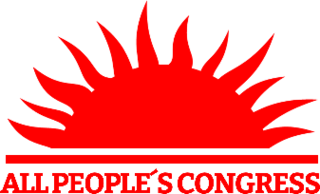
The All People's Congress (APC) is one of the two major political parties in Sierra Leone, the other being the Sierra Leone People's Party (SLPP). The APC is the main opposition party in Sierra Leone since April 4, 2018 when Julius Maada Bio of the SLPP won the 2018 presidential elections, though it maintains a majority in parliament.

The Grassroots-Legalize Cannabis Party is a political third party in the U.S. state of Minnesota created in 1986 to oppose drug prohibition. The party shares many of the progressive values of the Farmer-Labor Party but with an emphasis on cannabis/hemp legalization issues.

Elections in Mozambique gives information on election and election results in Mozambique.
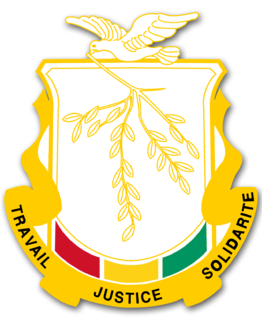
Guinea elects on the national level a head of state—the president—and a legislature. The president is elected for a five-year term by the people through a two-round system. The National Assembly has 114 members, elected for five-year terms, 38 members in single-seat constituencies and 76 members by proportional representation.
The Alliance for Patriotic Reorientation and Construction is a political party in the Gambia. Founded by army officers who staged a coup in 1994, it was the dominant ruling party from 1996 until 2016 with president Yahya Jammeh.
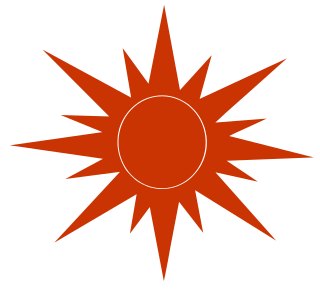
The People's Democratic Organisation for Independence and Socialism (PDOIS) is a radical socialist political party in the Gambia. Since 2005, it has been part of the National Alliance for Democracy and Development (NADD). It was part of Coalition 2016 in the 2016 presidential election, whose candidate, Adama Barrow, defeated long-time incumbent Yahya Jammeh. The PDOIS also publishes a party newspaper, Foroyaa, which was noted for its opposition to the Jammeh regime.
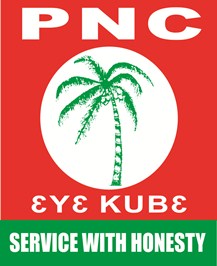
The People's National Convention is a political party in Ghana.

The Democratic Party is a centre-right political party in Mongolia.

The National Assembly of the Gambia is the unicameral legislature of the Gambia. The authorisation for the National Assembly lies in Chapter VII of the Constitution of the Gambia. It is composed of 53 members directly elected through first past the post, and a further five members appointed by the President.

Halifa Sallah is a Gambian politician who is currently a member of the National Assembly representing Serekunda, and the secretary-general of the People's Democratic Organisation for Independence and Socialism (PDOIS). He served as a spokesman and advisor to President Adama Barrow from during the 2016 presidential election campaign until March 2017.

Ousainou Darboe is a Gambian politician and lawyer who has served as Vice-President of the Gambia and Minister of Women's Affairs since June 2018, under President Adama Barrow. Darboe formerly served as Barrow's Minister of Foreign Affairs from February 2017 to June 2018.
Assan Musa Camara was a politician from Gambia. He served as Vice President of Dawda Jawara, almost continuously from 1972 to May 1982 and the Member of Parliament (MP) for Kantora from 1960 to 1987.

Presidential elections, legislative elections and local elections were held in the Philippines on May 11, 1992. This was the first general election held under the 1987 Constitution. An estimated 80,000 candidates ran for 17,000 posts from the presidency down to municipal councilors.
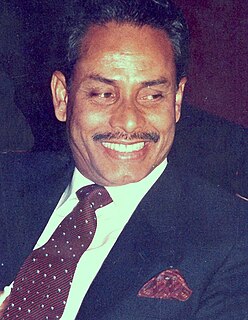
General elections were held in Bangladesh on 3 March 1988. They were boycotted by several major parties, including the Bangladesh Awami League, the Bangladesh Nationalist Party, the Communist Party of Bangladesh, Jamaat-e-Islami Bangladesh, the Bangladesh Krishak Sramik Awami League, the National Awami Party (Muzaffar) and the Workers Party of Bangladesh. The result was a victory for the Jatiya Party, which won 251 of the 300 seats. Voter turnout was 52.5%.

Vasudeva Nanayakkara is a veteran left-wing Sri Lankan politician, Member of Parliament and a former presidential candidate.
Presidential elections were held in Bangladesh on 15 October 1986. The result was a victory for incumbent Hussain Muhammad Ershad, who had assumed the office in 1983 following a military coup. Ershad reportedly won 84.1% of the vote with a voter turnout of 54.9%. However the elections were controversial as they were boycotted by all major opposition candidates and there were reports of irregularities.

Parliamentary elections were held in the Gambia on 29 March 2012. The ruling Alliance for Patriotic Reorientation and Construction (APRC) won 43 of the 48 elected seats.
















